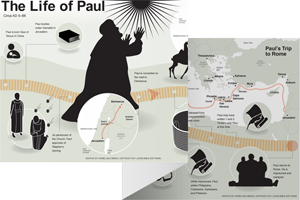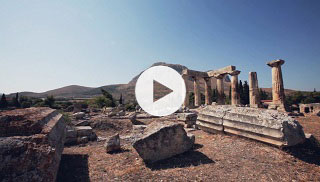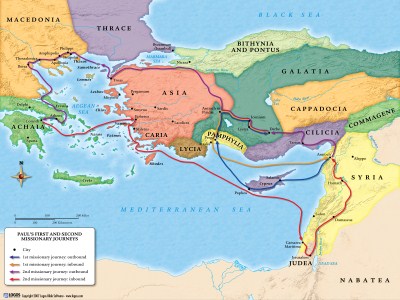1:1–2 Paul founded the church in Corinth around ad 50–51 during his second missionary journey (Acts 18). After 18 months in Corinth, he departed the city to continue his missionary work. Paul planned to visit Corinth again via Macedonia (1 Cor 16:5–9; 2 Cor 1:16), but instead traveled straight from Ephesus to Corinth. This visit turned out to be a painful experience, so Paul departed and wrote a severe letter to the Corinthian church (2:1–5; 7:12). When Paul heard about the Corinthians’ largely positive response to the letter (7:6–7), he wrote 2 Corinthians to commend the church, to prepare them for the collection for the Jerusalem poor (chs. 8–9), and to warn them of false apostles in their midst (chs. 10–13). But Paul is still experiencing great struggles with the Corinthian church; he addresses these issues throughout the letter. The events described in 2 Corinthians took place during Paul’s third missionary journey, with him writing 2 Corinthians ca. ad 55–57 from Macedonia (2:13; 7:5; 9:2). |
1:1 apostle Refers to Paul’s role as a commissioned minister of the gospel. See note on Rom 1:1.
 Pauline Self-Designations Table
Pauline Self-Designations Table
 Paul: A Life of Redemption and Transformation
Paul: A Life of Redemption and Transformation
through the will of God Paul emphasizes that his apostleship comes from God’s authority and not his own. He repeats this theme throughout the letter as a defense of his apostolic authority (2 Cor 1:21; 2:17; 3:5–6; 10:8; 13:10). See 1 Cor 1:1 and note.
Timothy Paul includes Timothy as a co-sender of this letter. The Corinthians knew Timothy because he accompanied Paul during his ministry in Corinth (Acts 18:1, 5). See note on Phil 1:1; note on 1 Tim 1:2.
as a co-sender of this letter. The Corinthians knew Timothy because he accompanied Paul during his ministry in Corinth (Acts 18:1, 5). See note on Phil 1:1; note on 1 Tim 1:2.
church of God By referring to the Corinthian church this way, Paul emphasizes that the community belongs to God. This title also reinforces the claim that the Corinthian church, which belongs to God, sits under Paul’s apostolic authority, which comes from God. See note on 1 Cor 1:2.
 The Church Devotional
The Church Devotional
Corinth See note on 1 Cor 1:2.
Achaia The southern region of Greece; Corinth
of Greece; Corinth was the capital.
was the capital.
1:2 Grace to you and peace See note on Rom 1:7.
God our Father See note on Rom 1:7.
1:3–11 Paul begins his letter with a benediction to God rather than his typical thanksgiving address (compare 1 Cor 1:4–9; Phil 1:3–11; 1 Thess 1:2–10). In this section, he discusses the comfort God provides during suffering. He begins by stating that his experience of comfort and suffering enables him to comfort others (2 Cor 1:4–6). He refers to a life-threatening affliction he experienced in Asia, identifying God’s intervening deliverance as his reason for continued hope in trials (vv. 8–10). |
1:3 Blessed Paul alludes to a Jewish expression of praise called the barakhah, the Hebrew word for “blessing” (Pss 66:20; 72:18; Eph 1:3; 1 Pet 1:3). Paul praises God for His provision of comfort during hardship.
called the barakhah, the Hebrew word for “blessing” (Pss 66:20; 72:18; Eph 1:3; 1 Pet 1:3). Paul praises God for His provision of comfort during hardship.
comfort The Greek word Paul uses here, paraklēsis (and the corresponding verb parakaleō), occurs 10 times in 2 Cor 1:3–7. It typically refers to encouragement or consolation given to someone who is suffering or in mourning (Matt 5:4).
1:4 affliction Paul may have the difficulties of his ministry in mind; see 2 Cor 11:23–29.
1:5 sufferings of Christ Refers primarily to the events Jesus underwent from His arrest to His death (Matt 26–27; Mark 14–15; Luke 22–23; John 18–19). These may also include the persecutions He suffered from religious leaders (Luke 19:47; John 5:18; 7:19) as well as the sufferings of His followers (e.g., 2 Cor 4:8–12).
1:6 we are afflicted Certain opponents in Corinth may have assumed that Paul’s sufferings delegitimized his apostleship, as they regarded suffering as a sign of weakness. Paul reminds the believers that his sufferings brought about the spread of the gospel by displaying God’s power (4:7–9).
your comfort Paul responds to his opponents by demonstrating that his suffering ultimately benefits the Corinthians. See note on 2 Cor 1:3.
salvation See note on Rom 1:16.
1:7 hope The Greek word used here, elpis, refers to a confident expectation of deliverance. It indicates a firm trust that God will fulfill His promises (Rom 4:13–25; see 2 Cor 5:5 and note). For Paul, the Holy Spirit provides an assurance of hope while undergoing suffering (Rom 8:18–30; see Gal 5:5 and note).
1:8 province of Asia A Roman province located in modern Turkey. Paul is probably referring to his hardships in Ephesus here (Acts 19:23–41; 1 Cor 15:31–32).
Paul is probably referring to his hardships in Ephesus here (Acts 19:23–41; 1 Cor 15:31–32).
1:9 sentence of death The severity of Paul’s persecution leads him to claim that he felt like a judge had condemned him to die (Acts 14:19–20). He juxtaposes death and life throughout this letter (2 Cor 2:16; 4:7–14; 5:1–10; 13:4).
1:10 our hope Paul confidently expects God to deliver him from persecution. He recognizes that God’s deliverance will not be for his own sake, but for the sake of believers and those who have not yet heard the gospel message (see Phil 1:21–26; 2 Tim 4:17).
1:12–14 After his opening greeting (2 Cor 1:1–2) and benediction (vv. 3–11), Paul begins to defend himself against the criticisms he faces. In this passage, he makes a general defense of his integrity and ministry. |
1:12 boasting See note on 1 Cor 1:29.
holiness and purity of motive Paul sought to maintain integrity in ministry to prevent the gospel from losing credibility. He was especially sensitive to the issue of financial support in the regions of Macedonia and Achaia;
and Achaia; he did not want others to perceive him as a peddler or ordinary philosopher (2 Cor 2:17; 1 Cor 9:1–12; Phil 4:14–17; 1 Thess 2:9).
he did not want others to perceive him as a peddler or ordinary philosopher (2 Cor 2:17; 1 Cor 9:1–12; Phil 4:14–17; 1 Thess 2:9).
merely human wisdom See note on 1 Cor 1:24.
1:13 anything else to you except what you can read The opponents in Corinth accused Paul of being insincere and deceitful (2 Cor 10:10), but Paul affirms that he made his intentions and expectations clear in this letter. This gave the Corinthian believers no excuse for disobedience or misunderstanding.
1:14 day of our Lord Jesus Refers to the ot expression “Day of Yahweh” (Isa 13:9; Joel 1:15; Mal 4:5). The nt writers equated this day with the day of Christ —the time when Christ returns to judge the wicked and deliver His people (see 1 Thess 5:2 and note).
—the time when Christ returns to judge the wicked and deliver His people (see 1 Thess 5:2 and note).
1:15–2:4 Paul moves from a general defense of his ministry and integrity (2 Cor 1:12–14) to a specific defense of why he did not visit the Corinthians as he had planned (1 Cor 16:5–7). Paul’s failure to visit Corinth apparently led some Corinthians to view him as unreliable (see 2 Cor 1:17 and note). After a brief statement about God’s faithfulness (vv. 18–22), Paul explains that he did not visit in order to spare them and give them an opportunity to repent (see v. 23 and note). Instead of returning to Corinth in sorrow, Paul wrote them a letter (2:1–4). |
1:15 to come to you previously Paul wrote to the Corinthians about his plans to visit them (1 Cor 16:5–7). When he did not arrive, some people questioned his commitment and integrity (2 Cor 1:17; Matt 5:37).
a second proof This probably indicates that Paul intended to visit Corinth twice: once on his way to Macedonia and then again on his way back to Judaea.
1:16 Macedonia The Roman province north of Corinth, also located in modern Greece. Paul founded churches in the Macedonian cities of Philippi, Thessalonica, and Berea.
cities of Philippi, Thessalonica, and Berea.
1:17 my “no” may be “no” Some Corinthian believers accused Paul of being indecisive or inconsistent about his return to Corinth (compare 2 Cor 1:15, 17), when in fact he chose not to visit because he did not want to cause them grief (1:22–2:4). Instead he wrote them a painful letter so they would repent (7:8–9).
1:18 God is faithful Paul may be using an oath formula similar to the expression “as surely as God lives …” (see Job 27:2 and note). If so, he uses it to stress that his words are true (compare 2 Cor 1:23).
our word Refers to Paul’s communication to the Corinthians—the gospel message as well as his travel plans (1 Cor 1:23; 16:5–7).
1:19 Silvanus and Timothy Two missionary companions who ministered with Paul in Corinth (see Acts 18:5–6). Paul includes both Silvanus—referred to as Silas in Acts (e.g., Acts 15:22)—and Timothy as cosenders of the letters to the Thessalonians (1 Thess 1:1; 2 Thess 1:1).
as cosenders of the letters to the Thessalonians (1 Thess 1:1; 2 Thess 1:1).
yes” and “no Describes contradictory messages. Paul affirms that his message was consistent with the teaching of Christ.
1:20 promises of God Refers to all of God’s promises in the ot. Paul also mentions God’s promises in 2 Cor 7:1, where he cites a series of ot quotations that highlight God’s adoption of His people (see 6:16–18 and notes). Elsewhere Paul refers to God’s promise to Abraham (see Rom 4:13 and note).
in him they are “yes” Indicates that God’s promises are true, trustworthy, and fulfilled in Christ.
1:21 who anoints Refers to an ot custom of marking a person for service to God.
1:22 sealed Signifies ownership. Paul writes elsewhere that God gave believers the Spirit as proof they belong to Him (see Eph 1:13 and note).
down payment of the Spirit The Holy Spirit is a down payment of the believer’s inheritance in the kingdom of God (see Eph 1:13–14 and note; 2 Cor 5:5 and note).
1:23 to spare you Paul previously corrected the Corinthian believers on a number of issues (1 Cor 3:21; 5:1; 6:1). Paul probably chose to delay his visit because he wanted to give the Corinthians the opportunity to repent and prove their obedience. He may have also wanted to avoid taking disciplinary measures—which would cause discouragement—against them.
1:24 lord it over your faith Paul does not control the Corinthians’ faith, nor does he function as a mediator between them and God. The Corinthian believers must take responsibility for their faith
The Corinthian believers must take responsibility for their faith and their relationship with God.
and their relationship with God.

|
About Faithlife Study BibleFaithlife Study Bible (FSB) is your guide to the ancient world of the Old and New Testaments, with study notes and articles that draw from a wide range of academic research. FSB helps you learn how to think about interpretation methods and issues so that you can gain a deeper understanding of the text. |
| Copyright |
Copyright 2012 Logos Bible Software. |
| Support Info | fsb |
 Loading…
Loading…






